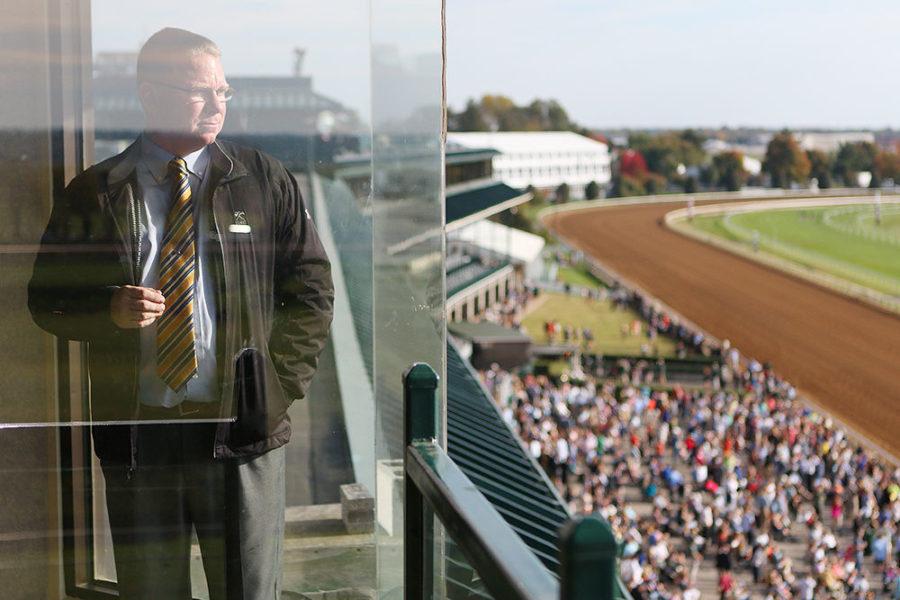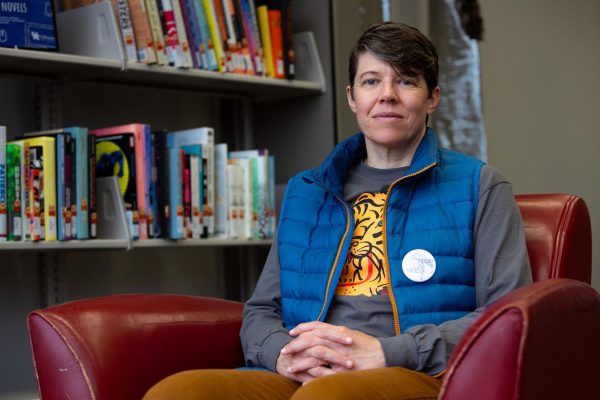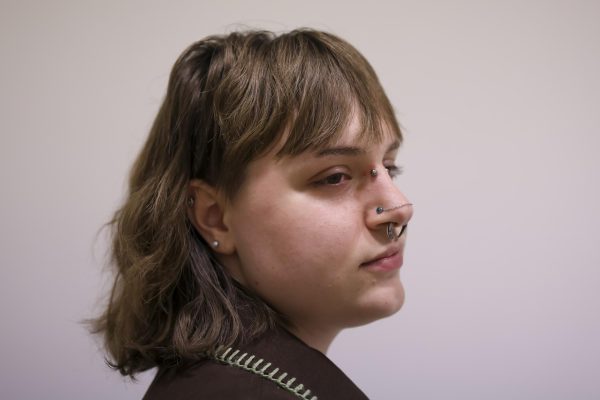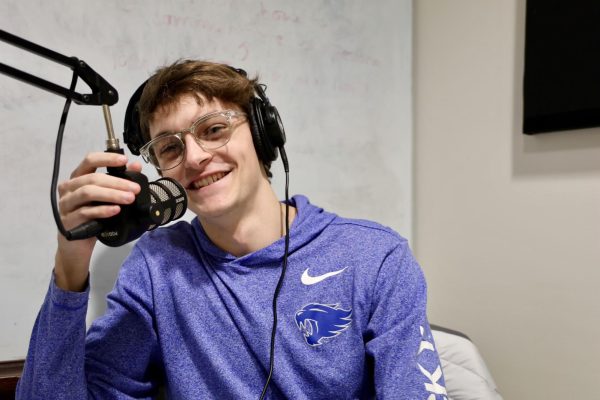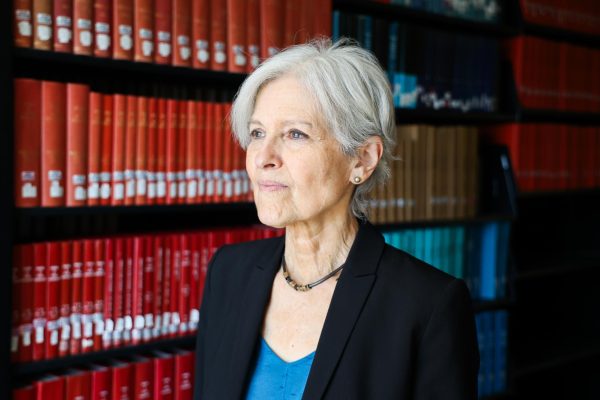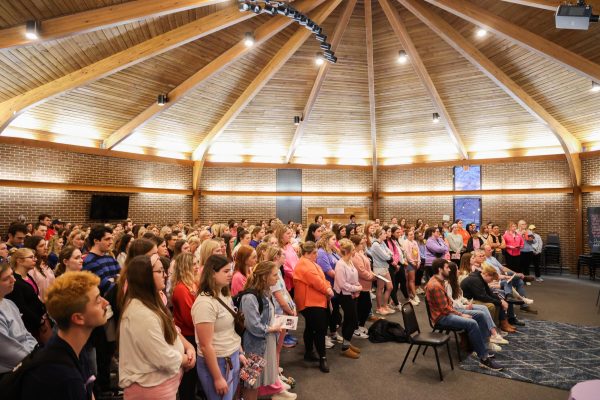Announcer reflects on career leading up to big day at Keeneland
October 29, 2015
By Morgan Lafferty
On a chilly, drizzly day in November of 1988, 19-year-old Kurt Becker sat in his parent’s barn-style living room watching the Breeders’ Cup races. Coming from a family in the Standardbred business, his parents were puzzled by Becker’s interest in thoroughbred racing but never discouraged it. Becker watched, eyes glued to the television as Alysheba took over the field with Tom Durkin’s voice announcing, “Alysheba wins the world’s richest horse race and he’s now the richest horse!”
Deeply envying as well as appreciating Durkin for his talent and ability to handle that kind of pressure and to deliver a race call so smoothly, Becker never imagined he would later be calling the Breeders’ Cup races at Keeneland.
Becker began his announcing career alongside his father who was also an announcer for races at county fairs in his home state of Illinois. In the summer of 1985, 16-year-old Becker called his first race at a county fair that his dad was supposed to call. His father was scheduled to announce two county fairs on the same day so he sent his son to the second county fair to work in his place.
“Even though I was young, I was confident I could do the job and part of the confidence stemmed from the fact that I remember there were short fields scheduled for the races that particular day,” Becker said.
After the day was done, his parents were impressed at his natural ability to call races and encouraged him to pursue announcing as a career. Becker had a different opinion and wanted to become a political commentator and live in Washington, D.C.
After receiving a political science degree from Southern Illinois University at Carbondale, Becker began more actively pursuing careers in announcing.
“I must say as I stand here now at age 46, I’m grateful that my dad pushed me outside my comfort zone,” Becker said. “If he had not challenged me in the way he did, I don’t think I would have the career I’ve got today.”
Becker started off at Red Mile in Lexington from 1988 until 1992 as an announcer. He later began his job in 1994 as a play-by-play announcer and anchor for Motor Racing Network’s radio coverage for the top three touring division of NASCAR, covering the Sprint Cup Series, Xfinity Series, and Camping World Truck Series, and is still involved with MRN today.
But Becker’s big break in thoroughbred racing came when he heard news that Keeneland was looking for a track announcer. After 60 years without a track announcer, Keeneland decided it was time to keep up with the times.
But they didn’t want an announcer from another racetrack; Keeneland wanted their very own announcer to have their own sound. Becker was hired in April of 1997, becoming Keeneland’s first track announcer. Although Becker did announce for Churchill Downs from 1997 until 1998, his schedule at Keeneland allowed him to maintain his job with MRN and gave him more leeway to juggle both jobs.
“The experience at Churchill was fantastic, that will be something I will always be grateful having and to say I was the track announcer there,” Becker said.
After two years working for Keeneland, he was able to expand his role and work the sales. The prospect of spending more time with Keeneland allowed him the chance to also get more involved with NASCAR.
“It was really a case of me wanting to diversify my schedule,” Becker said.
After 19 years of working at Keeneland, Lexington has become a second home for him. Growing up and still currently living in a small town in central Illinois, Lexington offers the best of both worlds; it’s a larger city that offers a lot of amenities and yet it retains a small town feel.
“People get to know you, they’re friendly, they’re neighborly, they’re kind and I have appreciated the friendships that have been shown to me for 19 years, it makes it fun. I look forward to coming down here (to Lexington). I look forward to coming into work everyday; I look forward to going out at night and going to a restaurant and talking racing with folks. If you love horse racing, this is the place to be. There is no other,” Becker said.
As a man who loves his job, Becker describes announcing as “painting a picture” for the audience; always inspired by good sportscasters and good announcers who can paint that picture for the audience who is unable to visually see the race.
“Here at Keeneland, for example, for the caretaker who might be working and doesn’t have time to walk up to the fence and watch the race, I want that person to have a picture of exactly how that race is unfolding,” said Becker of NASCAR. “The listening audience doesn’t have a visual reference and I like being able to paint the picture. Whether it’s describing the colors of the cars, whether it’s painting a picture of what the surrounding countryside or the speedway looks like, whatever it might be, that to me is a challenge and a thrill to be in that position to bring that type of information to the public and to enhance their experience.”
Becker is looking forward to announcing the play-by-play of this year’s Breeders’ Cup.
“I love the fact that every horse in these Breeders’ Cup races has a legitimate shot to win,” Becker said. “It’s exciting to me to have a chance to describe horses that may be 20 to 1 on Breeders’ Cup day that any other day of the year they would probably be an even money or an 8 to 5 favorite.”
Becker believes that any good announcer enjoys a good challenge, and he believes that his next challenge in announcing will be during the Breeders’ Cup to remember to call every horse in the field. Because all of the horses in the field are high level horses, he has to stay on his toes and watch for any horse that may come up and take the race.
“You have to put the odds out of your mind and realize every single horse has a shot to win,” Becker said. “As a result, you truly don’t know from race to race where the winner is going to come from. That’s the thrill and the challenge of it.”
In preparation for the Breeders’ Cup, Becker plans to spend a lot of time in the barns as well as watching morning workouts.
“I am a firm believer that things are less intimidating as they become more familiar,” Becker said, “Lack of familiarity breeds intimidation, at least for me as a race announcer. I want to see what these horses look like; I want to see them up close. Anything that makes me feel like I know that horse on a first name basis because then when they loading into the starting gate for the Breeders’ Cup it’s not so intimidating to me. I feel like they’re an old friend at that point.”
















































































































































